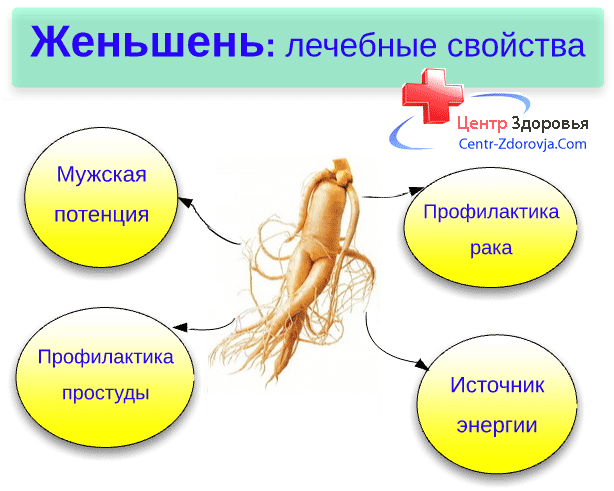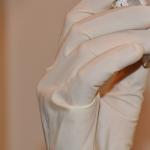Ginseng root is a popular herb used in tincture and extract capsules. In traditional Chinese medicine, ginseng is believed to cure almost all diseases. Modern research largely confirms the beneficial properties that Asian folk medicine endows with this plant. Ginseng both gives strength and soothes shattered nerves. It is useful in the deterioration of potency in men and other age-related disorders. It is recommended to use it for recovery after serious illnesses.

Ginseng stimulates the immune system, improves blood sugar and cholesterol levels, and is useful for cancer prevention. In the countries of the former USSR, the fashion for this plant appeared in 1986 after the Chernobyl disaster. Because it protects against radiation and other manifestations of adverse environmental conditions. It is not known how much ginseng improves endurance in athletes - research results are conflicting. But this plant is definitely useful for people who are engaged in mental work. Its extract increases concentration and learning.
Ginseng: instructions for use
| pharmachologic effect | Ginseng reduces general weakness, fatigue, drowsiness. Increases blood pressure, mental and physical performance, stimulates sexual function. |
| Indications for use | Adults - as a stimulant for mental and physical stress, arterial hypotension, neuroses, for recovery after illnesses. Ginseng is not prescribed for children. |
| Dosage | Tincture - 3 times a day before meals, 30-50 drops. Tablets and capsules - 1-3 pcs per day. Use ginseng supplements at the dosage indicated on the package. Do not exceed the recommended dose to avoid side effects. Do not take longer than 8-12 weeks in a row, take breaks in treatment. |
| Side effects | Ginseng is a potent herb that causes more side effects than other popular herbs. Allergic reactions, insomnia, headache, agitation, palpitations, nausea, vomiting, a jump in blood pressure, nosebleeds can occur. If you do not exceed the recommended dose and there are no contraindications, then the likelihood of these problems is low. |
| Contraindications | Allergy to ginseng or other substances that are part of the preparations. arterial hypertension. Increased excitability, insomnia. Bipolar disorder. Increased body temperature, acute phase of infectious diseases. Bleeding. Breast cancer in women. For alcohol tincture - alcoholism, cirrhosis of the liver, epilepsy. |
| Pregnancy and breastfeeding | There is no data on how ginseng preparations affect the course of pregnancy. Therefore, during pregnancy and during breastfeeding, it is better not to take them. |
| Drug Interactions | Ginseng preparations may reduce the effectiveness of hypertension medications. If you are taking aspirin, warfarin, clopidrogel, or other blood-thinning medicines, you are at increased risk of bleeding. Perhaps the negative interaction of ginseng and immunosuppressants, diuretics, MAO inhibitors. |
| special instructions | Ginseng should not be given to children. This remedy is best tolerated when taken with food rather than on an empty stomach. Stop using stimulant supplements 7 days before elective surgery. Lead a healthy lifestyle, do not rely on ginseng as a panacea for all diseases. |
Useful properties of ginseng
Ginseng has many beneficial properties for human health. It increases resistance to physical and mental stress, gives energy, stimulates the immune system, reduces the risk of cancer, lowers blood sugar in diabetics. Ginseng root is especially useful for men. It may help women with menopausal symptoms. The medicinal properties of this plant are discussed in detail below.
You should be aware that there are several varieties of ginseng. Panax ginseng is Asian ginseng, also known as Korean and Chinese. Considered the most efficient. It is grown in Japan and China for domestic consumption and for export. There is also an American variant of Panax quinquefolius. Traditional Chinese medicine considers it less effective. Although modern studies comparing varieties of ginseng have not been conducted. Finally, Eleutherococcus senticosus is the Eleutherococcus plant, sometimes referred to as Siberian ginseng. This is not real ginseng. Preparations of Eleutherococcus act in a completely different way.
Panax is a Latin word that means panacea, a cure for all diseases. In Asian folk medicine, ginseng has been and remains the most popular remedy. However, modern people treat it with reasonable skepticism. In order for the root of this plant to acquire its medicinal properties, it must be grown for more than one year, but at least 2-3 years, preferably 5-6 years. Few people are really capable of it. Moreover, almost no one controls the quality of additives. The market for health products containing ginseng is filled with quackery drugs. It remains only to focus on consumer reviews, of which there are many published on the Internet.
Energy source
Ginseng is called an adaptogen. This plant increases the body's resistance to various types of physical and mental stress, adds energy and possibly prolongs life. Typically, participants in studies of the effectiveness of ginseng for increasing energy fill out questionnaires. Scientists also monitor their results in physical and mental exercises. This allows you to get more or less objective information.
Adrenaline and other hormones produced by the adrenal glands are responsible for energy. The glands in the brain that make the adrenal glands work are the hypothalamus and the pituitary gland. First, the chemical signal travels from the hypothalamus to the pituitary gland, and from there to the adrenal glands. Ginseng extract stimulates all this complex chain, improves its work.
In the 1970s, the results of experiments by Soviet scientists were published. Soldiers who took ginseng tincture improved their results in the 3 km race. Radio operators more accurately transmitted information, less likely to make mistakes. Lab mice given this herbal remedy swam further than those fed as usual. Since then, dozens of other studies have been conducted with similar positive results.
Ginseng improves not only physical but also mental performance. The flip side of this is the side effects. There may be insomnia, overexcitation, anxiety, euphoria, a jump in blood pressure, nosebleeds. Regardless, ginseng is a safer stimulant than energy drinks. Do not exceed the recommended dosage.
Stimulation of immunity
Ginseng stimulates the immune system - it increases the number of protective cells in the blood, making them more active in destroying microbes and cancerous growths. A study was conducted with 323 people to find out if this plant helps with colds. Half of the participants took ginseng extract capsules at 400 mg per day for 4 months, the other half received a placebo. Among people who took this supplement, there were almost 4 times fewer cases of colds.
Another study tested what would happen if red ginseng was given along with a flu shot. 227 volunteers were divided into two equal groups. Half of them took real ginseng, the other half took a placebo. Four weeks later, all participants received a flu shot. After that, they continued to take the herbal extract or placebo for another 8 weeks. Those who took real ginseng had much more antibodies to the influenza virus in their blood than those in the placebo group. The frequency of colds in the ginseng group was reduced by 3 times.
In fact, ginseng has a complex, combined effect on the immune system. Therefore, it is not recommended to prescribe it in the acute stage of infectious diseases, but only after the patient is on the mend. Sometimes chronic fatigue is caused by a virus that suppresses the immune system. In such cases, ginseng can help. Probably, the extract of this plant slows down the weakening of the immune system in AIDS patients. But this issue requires further research.
Read about immune boosting herbs:
Oncological diseases
It is believed that regular consumption of ginseng reduces the risk of cancer. Moreover, ginseng extract helps better than pieces of a fresh plant, juice or tea. In Asian countries, many types of cancer are less common than in the West. One of the reasons explaining this may be the frequent use of ginseng by the population. It is not known at what doses this plant should be taken in order for the effect on cancer prevention to be optimal. It is not possible to obtain reliable information. It would take decades of research.
Perhaps ginseng should be taken by cancer patients in addition to the main therapy. This plant can block the growth of cancerous tumors in many ways, and most importantly, it reduces the side effects of chemotherapy. At the Mayo Clinic, cancer patients were given ginseng or a placebo for 8 weeks in addition to standard treatment. Patients who took the real herbal preparation, rather than the "dummy" one, had 20% less fatigue and a better quality of life than those in the placebo group. The Mayo Clinic is a respected American medical institution that generally frowns on alternative medicine.
Read also:
Ginseng for men
Ginseng is a useful remedy for men if you are lucky enough to find good quality supplements. This plant helps with impotence and male infertility. In addition to adverse age-related changes, diabetes mellitus and poor environmental conditions can be the cause of impotence and male infertility. Ginseng inhibits the development of diabetes, and also protects the liver from environmental toxins. The results of studies proving that this plant helps with erectile dysfunction have been published in reputable journals in urology and andrology.
See for example the article "Study of the efficacy of Korean Red Ginseng in the treatment of erectile dysfunction" in the Asian Journal of Andrology, March 2007. The participants in the study were 60 men who admitted to the doctor that they had problems with potency. They were divided into two groups. Half took Korean red ginseng 1000 mg 3 times a day, the other half took a placebo. In the group of patients who took the real herbal extract, 20 out of 30 people (66%) confirmed that their potency improved. There were no changes in the placebo group. Ginseng improved potency in men, but did not affect their levels of testosterone, prolactin and cholesterol in the blood.
Potency can be negatively affected by chronic fatigue or anxiety caused by stress. Herbal preparations partially solve these problems. They both add energy and calm the nerves. Ginseng increases the number, mobility and vitality of spermatozoa. Therefore, it is advisable to prescribe it to men with infertility, along with other herbs and supplements. This is confirmed by articles published in reputable medical journals, and not just works on alternative medicine. Also take zinc supplements. It is an essential mineral for sperm production and prostate disease prevention.
To improve potency, first of all, you should try the original drugs Viagra, Levitra or Cialis, which are sold in pharmacies, and secondly, ginseng. Find a qualified urologist and consult with him. Ask your doctor if you need to increase testosterone in the blood and if so, how to do it. Do not take testosterone boosters on your own. Do not use any potency supplements sold in sex shops - it is deadly.
For women
Traditional Chinese medicine does not recommend ginseng for women because the plant enhances the masculine yang energy in the body, while the feminine energy is called yin. However, many modern women take ginseng. They are satisfied with the effect that this supplement has on their body. Stimulant herbal remedy increases energy, and does it better than caffeine. The energy that this root gives is similar to cheerfulness after a good night's sleep and healthy food. It is believed that ginseng rejuvenates the body, stimulates libido not only in men but also in women.
A study was conducted with 384 women to see if ginseng helps with menopausal symptoms. Half of the participants took a real plant extract, the other half took placebo capsules that looked the same. The frequency of hot flashes and the levels of hormones in the blood did not differ between groups of women. But the participants who took real ginseng noted that their mood improved and energy increased. This plant is not recommended for women suffering from hypertension, so that blood pressure does not rise even more. Occasionally, ginseng causes severe pain in the mammary glands in women.
Diabetes
As a rule, ginseng slightly lowers blood sugar in diabetic patients, but the effect is very weak. Some studies have shown that this plant, on the contrary, increases sugar. In diabetes, ginseng can be taken to increase tissue sensitivity to insulin, slow down the development of vascular complications, and also for the restorative effect that this plant has. But don't count on it to seriously improve blood test results for plasma glucose and glycated hemoglobin.
In 2008, the results of a study in which 19 patients with type 2 diabetes took part were published. Even before the start of the trial, all of them had well controlled their disease - they had glycated hemoglobin no higher than 6.5%. Half of the participants took ginseng extract 3 times a day, the other half - a placebo. After 12 weeks, those who took the real herbal preparation had decreased fasting morning blood insulin levels, and had less rise in blood sugar after eating and loading with glucose solution. At the same time, glycated hemoglobin did not improve.
In diabetic patients, ginseng reduces the level of cortisol in the blood. Perhaps due to this, the sensitivity of tissues to insulin increases. Diabetics who suffer from hypertension need to be careful with ginseng preparations because they increase blood pressure. Study the article "". Controlling type 2 and even type 1 diabetes is easier than you think. This can be done without a "hungry" diet and harmful pills. Type 2 diabetics do not need to inject insulin.
Cardiovascular diseases
Ginseng contains many antioxidants. These are substances that protect blood vessels from damage by free radicals. It is assumed that the intake of antioxidants inhibits the development of atherosclerosis, cardiovascular disease, diabetes and other health problems that are considered age-related. Objective studies of the effect of ginseng on the course of cardiovascular diseases have not been conducted. This plant cannot be considered a first choice medicine for coronary heart disease, arrhythmia, heart failure.
Perhaps, in high doses, ginseng lowers blood pressure, but so far this is nothing more than a rumor. As a rule, in normal dosages, this plant increases blood pressure by stimulating the production of adrenaline by the adrenal glands. Hypertension is a common side effect of this remedy. If you have been diagnosed with hypertension, a blood pressure of 160/100 mm Hg. Art. or higher - do not take ginseng without a doctor's approval. Keep in mind that a sudden increase in pressure can be a side effect. Keep high blood pressure medications on hand that work quickly.
Treatment of cardiovascular diseases:
conclusions
The article provides objective information on how useful ginseng can be. There is enough evidence to support the effectiveness of this remedy for increasing energy, strengthening immunity, preventing cancer, improving male potency and solving other health problems. Because ginseng is a potent herb, it can cause side effects. They are listed in detail above, as well as contraindications. Be prudent, do not exceed the recommended dosage indicated on the drug package.
Unfortunately, ginseng root needs to be grown not for one year, but for several years. It's expensive and difficult. Therefore, there are many quack drugs on the market, the packaging of which says that they contain ginseng. In fact, there may be a placebo inside. On sites that sell herbal supplements, customer reviews help make a choice. But if you try, you can write fake positive reviews that look convincing. Charlatans often do this. Ginseng can help, but don't count on it to solve all your problems. Lead a healthy lifestyle - this gives guaranteed results, unlike the "magic" dietary supplements.


